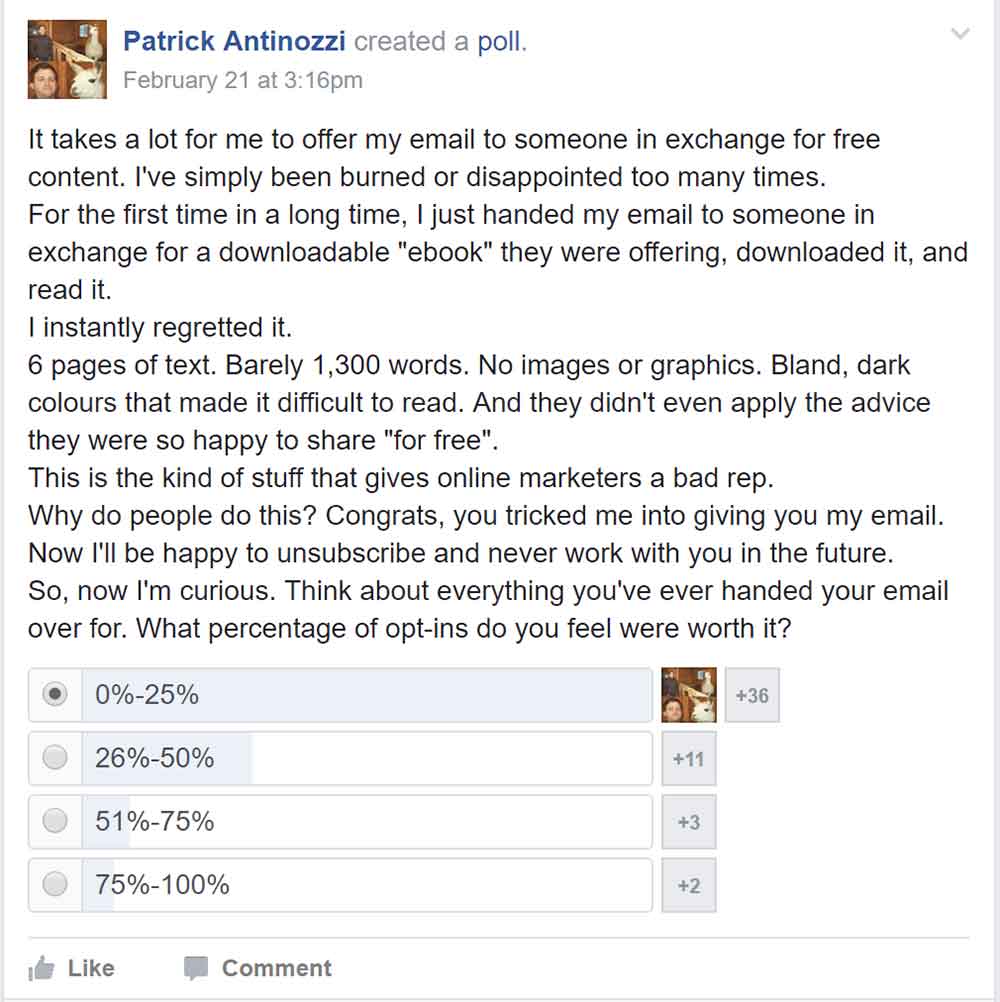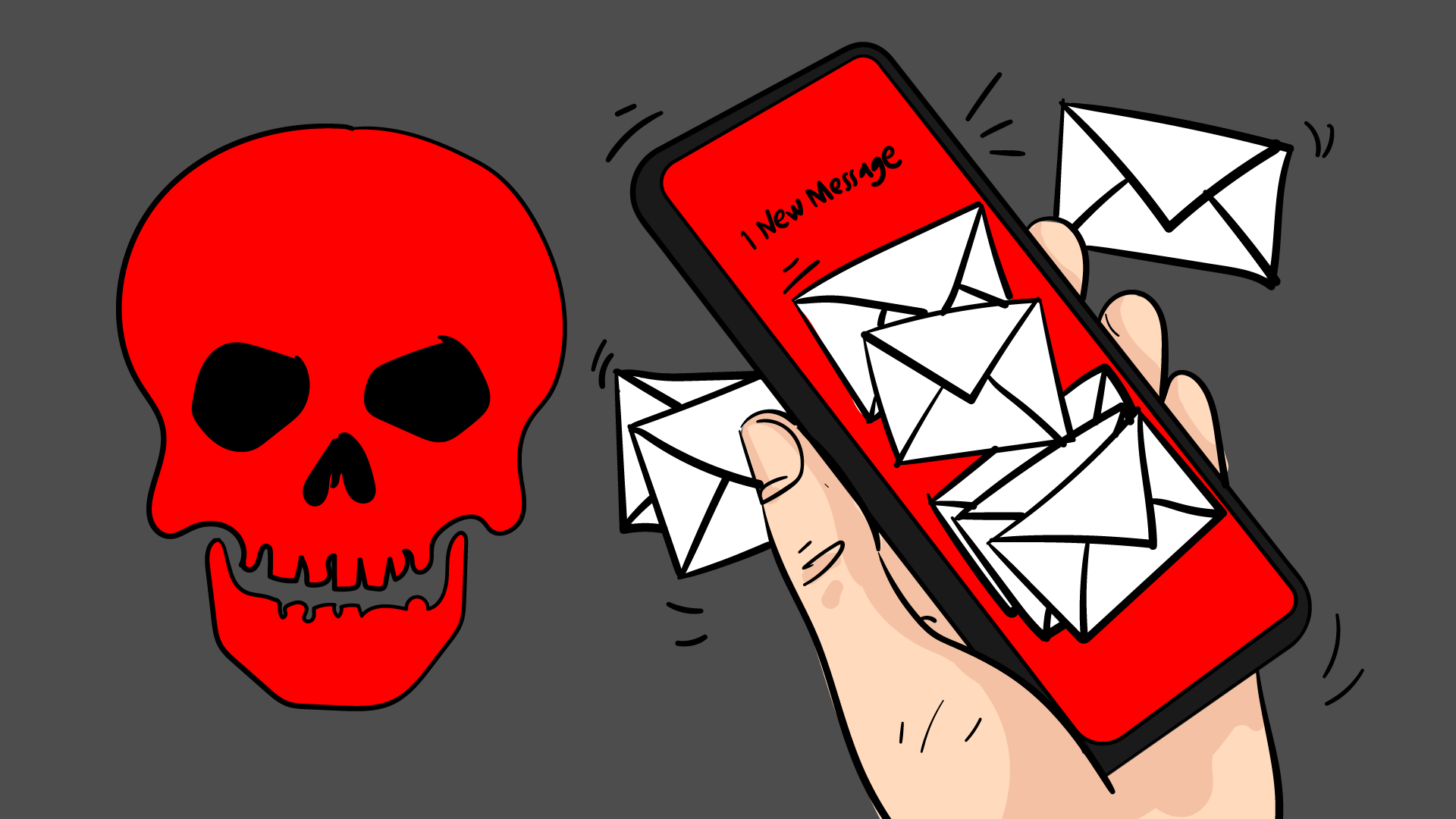My word, do online marketers ever love their email “marketing”.
A few years ago, before I decided to delete Facebook entirely, I was part of a number of Facebook groups focused on building an audience for your online business. By far the most common topic of discussion was how to capture a visitor’s email.
The email, as many online marketers will tell you, is the Holy Grail of online marketing.
They make it sound as if all you need to gain a new customer for life is to get their permission to email them constantly.
If you have someone’s email, how could they possibly ignore you, right?
And so, while engaging with members of these Facebook groups, I found myself regularly falling down this rabbit hole of discussing “how to write enticing sales copy, create attractive images, throw as many popups as possible at your visitors and see what sticks”, and on, and on…
It never ends.
My favorite posts were the ones that complained about users subscribing in order to download this supposedly ultra-valuable “content upgrade”, and then immediately unsubscribing after receiving the first email.
In fact, many of these marketers who complain about it admit to doing it themselves.
I gave email opt-ins another shot

It takes a lot for me to offer up my email to someone in exchange for content. I’ve simply been burned too many times in the past.
Recently, I gave it another shot. I’ve been doing a lot of research on a specific topic lately, and I came across a site that was promising something that I had been searching for extensively.
In short, they caught me at exactly the right time.
So, I gave them my email in exchange for a super-duper ultra mind-blowing experience of an eBook. At least, that’s how they described it.
I downloaded the eBook and read it.
I instantly regretted my decision.
It was barely 1,300 words. It contained no images, illustrations or graphics. There was no mind-blowing new perspective or angle on a well-tread topic. Even the colors they used made it incredibly difficult to read.
The best part? They didn’t even apply the advice they were so happy to share “for free”.
There was zero substance to this thing.
So, what do you think happened next? I unsubscribed from his email campaign as soon as I got the first email from him.
This experience once again reminded me of the ridiculous state of email marketing, and it got me thinking. How many other people have gone through this exact experience? How many times have people actually received what they considered to be a true value in exchange for their email address?
I posed the question to one of the Facebook groups I was a part of. It didn’t get as much traction as I was hoping for, so it is a pretty small sample size. (Perhaps it was a bit too lengthy, but I was annoyed and a tad ranty.)
I still found it enlightening.
Question: What percentage of email opt-ins do you feel were worth it?

A few observations about this poll:
- 69% of pollers feel they have either never, or nearly never, received something valuable in exchange for their email.
- 90% of pollers say they have received value in less than half of their email opt-ins.
90 percent!
So, why do we keep doing this? Why do online marketers insist on using this antiquated marketing strategy and imposing an awful user experience on their own visitors?
Money, obviously.
Not the money that comes in from a “successful email marketing campaign”, of course. I’m talking about the money that well-known, established bloggers get through selling these email marketing tools.
“Big-name blogger X says I should use tools A, B, and C as part of my email marketing campaign. But she provides actual data on the success she herself has enjoyed because of these tools!”
Does she, though?
I’ve already detailed how I feel about pop-ups, and the ridiculous lengths bloggers go to to shove them into your face at every opportunity.
AND how marketers use twisted metrics of success to justify using them. (apparently a 5% conversion rate is good? ????♂️)
But here’s what many people don’t seem to realize, especially when it comes to people who are new to the online marketing game.
These big-name bloggers can get away with these crappy email opt-ins and campaigns because they’ve already built a brand for themselves. They’re well-established and recognized as authorities in their industry.
At that point, you can sell a lot of stuff on brand recognition alone. Just ask some of the biggest brands in the world.
When you’re new to your industry, you can’t be pulling this garbage. You have to build an audience first. Trust, authority, and recognition should be your focus.
How do you do that?
Let people subscribe on their own terms
I had a newsletter that I sent out to my email subscribers every week. I’m not against email as a marketing tool. What I’m sick and tired of are the gimmicks and trickery that marketers use to get you to subscribe.
If someone genuinely loves your content, and wants to get more of it in the future, they will gladly hand over their email to you based on that premise alone.
Remember, you want your followers to actually be engaged. What’s the point in having a list of 10,000 emails if nobody wants to hear what you have to say?
Do give your visitors the opportunity to subscribe. Don’t use “content upgrades” and “freebies” to try to convince them to do so.
Give your stuff away for free
Stop gating your content behind mandatory opt-ins. Stop tricking people into doing things they don’t want to do.
Show the world you actually know what you’re talking about. If you’ve got great stuff to share, don’t hide it in sub-par eBooks that people have to give their soul away to read. Post it up on your blog. For free.
Once you’ve proved your worth, people will come back to you to solve their problems. And that’s when you gain real customers for life.
And for the love of everything that is beautiful in this world, stop it with the awful pop-ups. If I can’t convince you, Google will soon enough.





